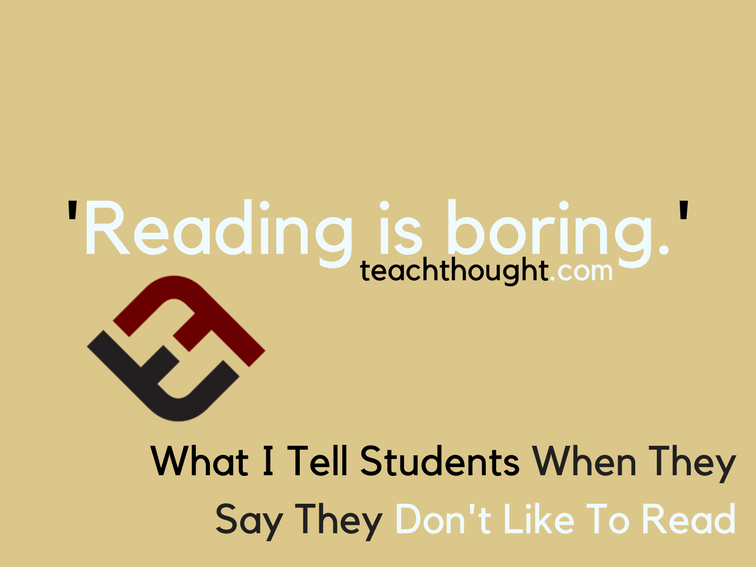
What Do You Tell Students When They Say They Don’t Like To Read?
by Terry Heick
When students say they ‘don’t like reading,’ the first thing I do is skip the preaching and try to relate–to meet them where they are, so to speak.
Something like this:
[8th-grade male, pouting]
Them: “I hate reading.”
Me: “You hate it? Like actually hate?”
Them: “It’s boring.”
Me: “Yes, it can be boring. I had to read so many boring books in school.”
Them: “You did?”
Me: “Yes. And it didn’t stop. 40 pages a night for this book, 10 pages for that one. I rarely got to choose the books, either. And when I did, I didn’t really get to choose but rather got to pick between two or three choices. Kind of like being offered three different kinds of rump roast when you don’t like to eat rump roast.”
Them: “Rump roast?”
Me: “And I never got a chance to understand why I should read. I mean, I knew it was good for me, like flossing. But I didn’t really understand why. My teachers would make contests out of reading, or give ice cream parties, or points. Sometimes there’d be special field trips for the kids that loved to read a lot. That was a bummer because I didn’t like to read–or thought I didn’t anyway.”
See also Why Students Should Read
Them: “Thought you didn’t?”
Me: “Yeah. Turns out I’m just a super picky reader. No one likes all books. Some readers may love the idea or process of reading, but really what they love are ideas. The way writers can create pictures in your head. The way reading quiets your mind and relaxes you. But actually reading is just the way to get those things. Reading is just a strategy.”
Them: “A strategy?”
Me: “Yeah–a way to do something. Reading can help you do anything: take apart an engine, design a bridge, become inspired, understand other people, fall in love, experience every emotion imaginable. Fear. Curiosity. Contentment. Annoyance. Awkwardness. Pride. Longing. Books help you understand, and understanding helps you feel.”
Them: “I guess.”
Me: “It’s true. That’d help me know and feel and understand and grow. I’m a different person when I finish a book than when I started.”
Them: “How?”
Me: “Well, I’m a little older for one. Sometimes it takes me months or even years to finish a book. And usually, I’m a little bit smarter, but that’s not why I read. Every book is a collection of ideas and characters and symbols and metaphors. And song lyrics and movie quotes and rappers and video games and girlfriends and boyfriends and fast cars and everything else because these things help me understand the books and the books help me understand these things.”
Them: “You lost me.”
Me: “Emotions are fuel.”
Them: “How?”
Me: “Think of a rocket–the burning of fuel creates the thrust that launches it into orbit. That’s what emotion does–it launches.”
Them: “Launches what?”
Me: “Anything. If you pay attention to something long enough to understand it and understand it well enough to feel something–well, that’s the secret behind everything great that everyone’s ever done.
Michael Jordan, Alexander the Great, Abraham Lincoln, Nikola Tesla, Robert Frost, Martin Luther King, Jr. These people saw something, felt something, and did something. The ideas in a video game or song or movie–they’re the same thing. The same sorts of ideas packaged in different ways.”
Them: “Really?”
Me: “Some use light. Some use colors. Some use sounds. Some use attitude or big words or whatever else. But they’re all ideas.”
Them: “What’s that got to do with a rocket?”
Me: “Scratch the rocket part. Let’s think about music. What books do better than almost anything else is give you a rhythm that you can’t help but follow. Every page is a tick-tick-tick-tick. Just read the pages and you’re following the rhythm.”
See also Why So Many Students Dislike Reading
A video game is kind of like this. And so is a song and a movie and a comic book and editorial cartoon and tweet and so on. But none of these things have the range that books have.”
Them: “Range?”
Me: “There are millions of books about everything imaginable written in every single tone, format, and structure you can imagine. Books are infinity.”
Them: “Mr. Heick, you’re weird.”
Me: “If you say you ‘hate reading,’ that means you hate ideas and emotions. Feeling things. Creating things. Exploring things. Achieving things. Next time you say you hate reading, say instead, “I hate feeling things,’ or ‘I hate stories and ideas written with words on pieces of paper that can help me achieve anything I’ve dreamed and can help me dream if I haven’t.”
Them: “You’re so weird.”
“The point is, you’re just a picky reader, and that’s a sign of intelligence. In a library with 10,000 books, I would be bored to tears by 98% of them, but that means there are 200 books that I’d love.
Go find your 200 books–let the ideas and emotions change you, and then do something that changes the world.”